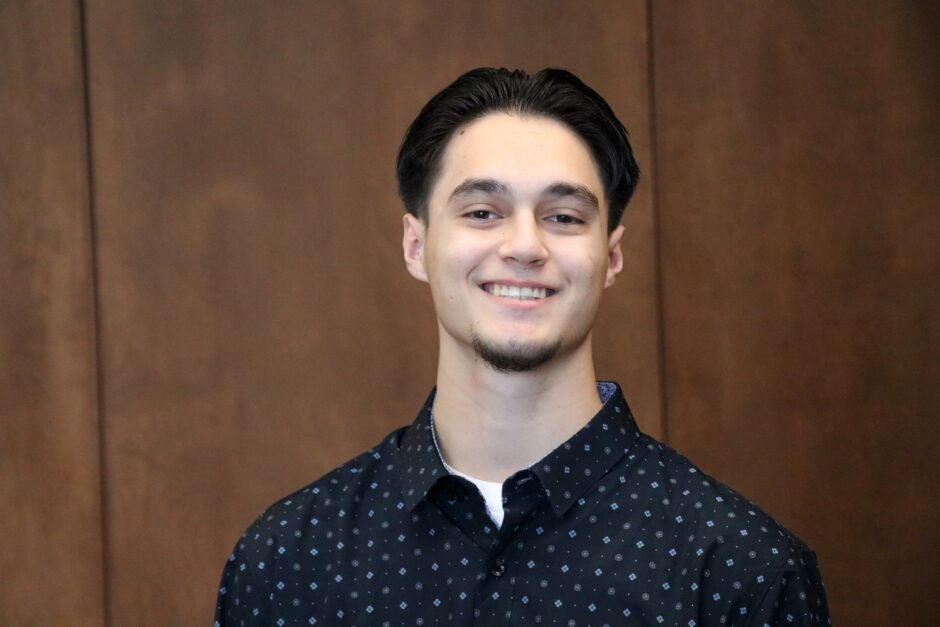Remembering a Fallen Warrior
When I was eight my grandfather came into the house with serious burns on his arms.
A few minutes earlier, he had been outside disposing of some garbage in a fire barrel and like any true Albert County, N.B. resident, you must use a good dose of gasoline to get the process going.
The room erupted with shouts of concern. Grammy wanted to call an ambulance, mom wanted to drive him to the hospital. Grampy just growled, grabbed a towel, wrapped it around his arm and left. On his way out the door, he informed us he was going to be the one to “drive himself to the hospital.”
There was no point in objecting. He had decided and now this was just how this situation was going to play out. And it did.
This is the fondest memory I have of him. His unrelenting strength, stubbornness and commanding authority was on full displace. This was long before I knew about his service during World War II. As such, Remembrance Day had little meaning to me as a child other than a day to skip out of classes and pin on poppies.
It wasn’t until high school that I really understood what was behind that gruff exterior.
On Nov. 11, I tried to remember my grandfather as I watched Claude Brulé, president of Algonquin College, place a wreath in front of a makeshift cenotaph alongside a military escort. Tomorrow the stage will be gone, and replaced by rows of cafeteria-style tables where students will eat and laugh and, for the most part, forget for another year.
My grandfather was Manford Hueston. A 26-year-old from Point Wolfe, N.B. in a region that is now occupied by Fundy National Park. When the war broke out in September 1939, he enlisted in the army and joined the North Shore Regiment.

Then things get foggy. As a family we’ve have mostly figured out he was at the D-Day landings. He then spent time in Belgium, Netherlands and Germany. Most of this information had been gleaned over the years by his daughter, who is also my aunt, Marlene Hueston. She said anything she did learn was very short on details.
It was something that you just didn’t talk about.
David Carty has heard stories like my grandfather’s often over the years, men and women who are tough beyond measure yet cannot talk about their experience in war. A Legion member, Carty has spent the last few weeks selling poppies to students who passed by his table in the Marketplace Food Court.
“The individual subjects of war were not part of conversations,” said Carty. Both Carty’s parents had served during the war as well as two of his uncles. He said he also had a difficult time getting any information from his parents about their wartime experience.
“Everyone in war is somehow traumatized,” said Carty and added that some had it worse than others. “They felt it a disservice to trigger the trauma of other servicemen.”
It took years, but with research and patience he did get his parents to open up about their stories. He compiled these memories into a book he calls A Chronicle of the Carty Family History for the Last 100 Years. It was with him at his table the last few weeks and he shared it with any students. His goal in sharing the book was to get students to think about their own heritage when Remembrance Day comes around.
“Reflect back on your own ancestry. How far back can you go?” said Carty. “Draw forth the memories of those that fought in those wars. How did their sacrifice domino down to you.”
This message is important as the fundamental meaning of Remembrance Day has changed over the years from its initial inception.
It was created 100 years ago today, by King George V, on the one year anniversary of the armistice that would end the supposed “war to end all wars.” The ceremony was created to honour those who were lost in the war. Also, it was a reminder of the cost the world paid for peace so we would never repeat it.
Well, that didn’t last 20 years before the world was plunged into an even more devastating conflict. The aftermath of these conflicts left two generations with dead friends and loved ones where almost none escaped its effects.
Remembrance Day gained a renewed purpose as families and soldiers dealt with the loss of those closest to them. For some soldiers, the ceremony caused too much anxiety and they avoided it. Others, like my grandfather, never missed a service. Neither did my aunt Marlene, now 64, who was born following the war.
“Remembrance Day was a very special day for many of them,” she said. “It was a very special day. Dad enjoyed the camaraderie that went with it. He enjoyed the group recognition and he thought it important to remember those that didn’t come back.”
As the years passed, education about Remembrance Day was brought to schools and children were taught its importance. The day was even made an official holiday in many Canadian provinces.
Then as the century began to come to a close, our veterans began dying. Not of bullets or bombs, but of old age.
In 2002, grampy passed away. I say this suspiciously because I am not quite sure anything could kill that man. Aunt Marlene has continued over the years to honour her father each and every Remembrance Day and has no intention of stopping.
“The focus is different,” she said, “When we laid crosses, we put poppy crosses in memory of veterans that passed away. It used to be all for veterans who passed away in the war. Now it’s about elderly men who passed away in the war.”
But she also reminded me that just because the veterans of the World Wars may be short for this world. There are still veterans out there who deserve the honour and respect of Remembrance Day.
“There are veterans now in Afghanistan. So, it goes on.”








